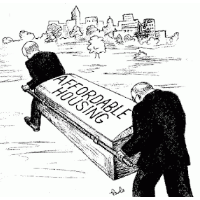2,595 Apply for 18 Affordable Housing Units in San Francisco

Recognizing that the tech boom and skyrocketing rents are pushing middle class and lower-income families out of San Francisco, Mayor Ed Lee committed in August to building 15,000 affordable housing units.
The goal is 2020.
For now, desperate renters will have to be satisfied with offers like the one from real estate developer Forest City. The company is building a 90-apartment complex on Market Street and as part of the deal is offering 18 affordable units. The developer handed out 6,500 applications and received 2,595 back, according to the San Francisco Chronicle.
The applicants were placed in a lottery to pick out 400 finalists. The drawing was held in an auditorium in the Chronicle building and more than 100 people showed up for the festivities. “A gold cylinder on a table held thousands of red tickets,” the Chronicle reporter wrote. “The wheel was turned, a ticket was picked and a number and name read out.”
As theater goes, the event lacked a certain drama, although the potential was there. “It’s like they are auctioning off hope,” said Amy Anderson, who was attending her third apartment auction. What was missing was a string of down-and-outers telling personal stories of need in front of a live audience, competing for a chance to avoid sleeping accommodations in homeless shelters, in cars and on the street.
The mayor’s Office of Housing says the city has 21,499 affordable units. The California Housing Partnership Corporation (CHPC) calculated in a recent report (pdf) that the city needs another 40,845 affordable units to house the city’s very-low- extremely-low-income residents.
The report said that 59% of very-low-income households spent more than half their income on rent. It noted that the state had “dramatically” reduced its direct funding of affordable housing:
“State Housing Bonds funded by Propositions 1C and 46 are exhausted, meaning the elimination of more than $18 million in investment to provide homes to low- and moderate-income households in San Francisco. The elimination of Redevelopment funds led to a loss of nearly $28 million annually in local investment in the production and preservation of affordable homes in San Francisco County.”
Federal money has also dried up. Overall, there was a “69% decrease in state and federal funding for affordable homes in San Francisco” between 2008 and 2013.
Whether renting or buying, San Francisco has the country’s least-affordable housing, according to the Public Policy Institute of California (pdf). Last Tuesday, San Francisco voters rejected Proposition G, a measure that would have tamped down real estate speculation by imposing a significant transfer tax on multi-unit investment properties, many of them rent-controlled, sold within five years of purchase. It lost 54-45%.
One cynical observer has suggested that the affordable housing crisis might be mitigated by using a little imagination. Perhaps some entrepreneur could find a way to market affordable-housing auctions in the city as entertainment, a reality TV show perhaps, that would designate a percentage of advertising revenues, or contributions from concerned viewers, to working class people who can’t afford to live near where they work.
But that is probably as likely to be adopted as the nine-point program for local and state leaders suggested by the Housing Partnership.
–Ken Broder
To Learn More:
Microcosm of S.F. Housing Plight: 2,595 Applications for 18 Units (by C.W. Nevius, San Francisco Chronicle)
San Francisco's Love-Hate Relationship with Affordable Housing (by Karen Weise, BloombergBusinessweek)
California’s Housing Market Is Recovering, but the State Faces Many Challenges (Public Policy Institute of California) (pdf)
S.F. Affordable Housing Advocates Dig In for Next Battle (by J.K. Dineen, San Francisco Chronicle)
San Francisco Thinks Small, Ponders Shoebox Apartments (by Ken Broder, AllGov California)
How San Francisco County’s Housing Market Is Failing to Meet the Needs of Low-Income Families (California Housing Partnership Corporation) (pdf)
- Top Stories
- Controversies
- Where is the Money Going?
- California and the Nation
- Appointments and Resignations
- Unusual News
- Latest News
- California Forbids U.S. Immigration Agents from Pretending to be Police
- California Lawmakers Urged to Strip “Self-Dealing” Tax Board of Its Duties
- Big Oil’s Grip on California
- Santa Cruz Police See Homeland Security Betrayal in Use of Gang Roundup as Cover for Immigration Raid
- Oil Companies Face Deadline to Stop Polluting California Groundwater





